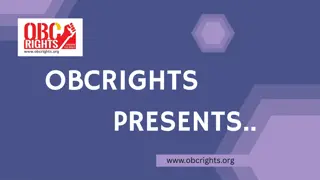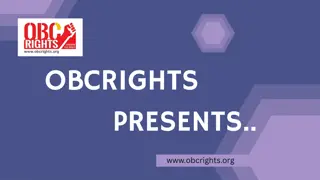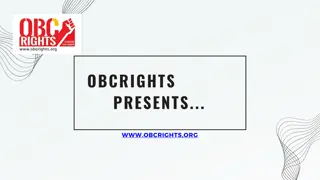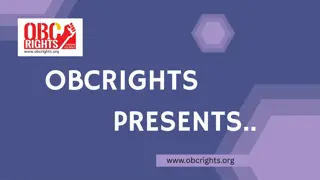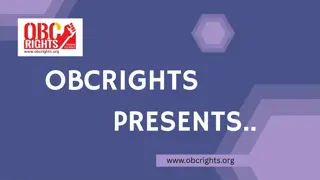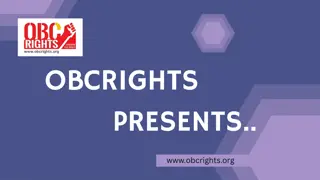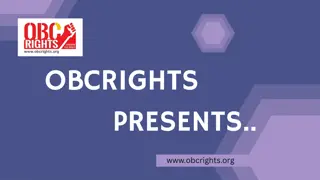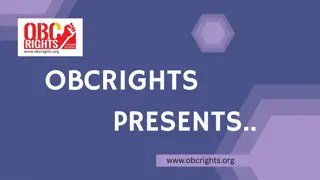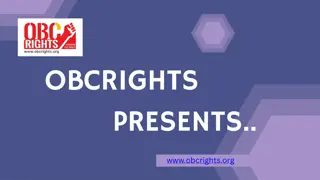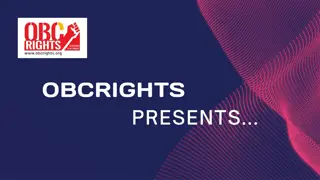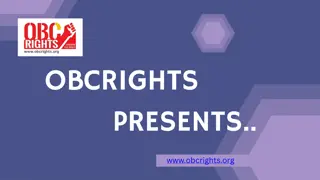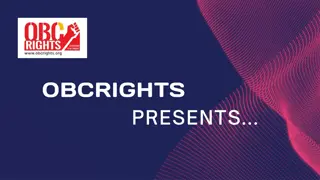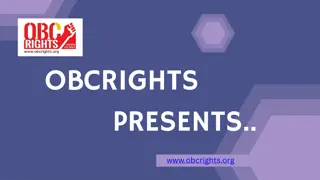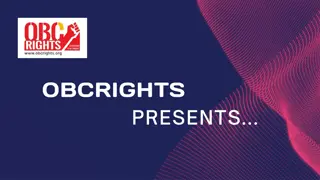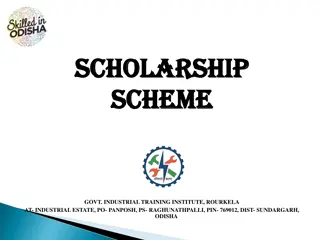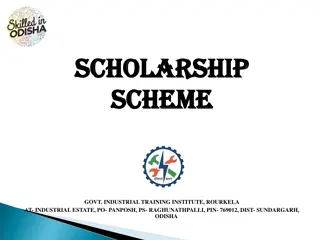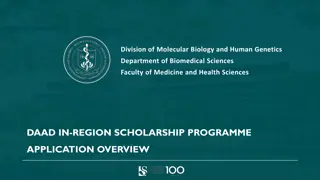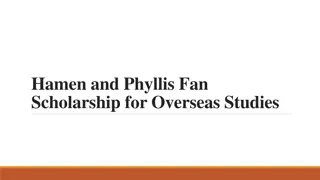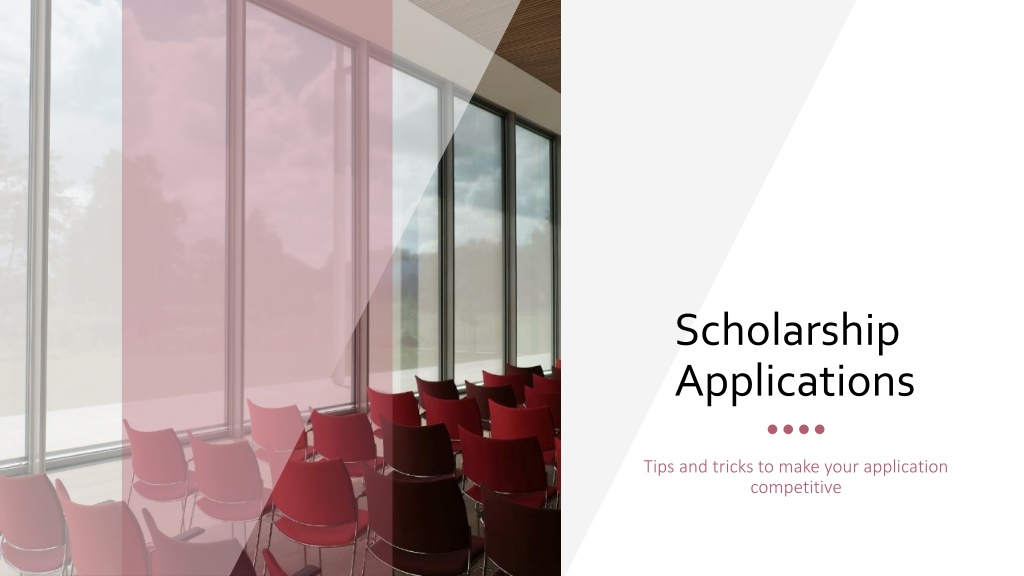
Scholarship Application Strategies for Competitive Success
Discover tips and tricks to enhance your scholarship application competitiveness. Gain insights into application deadlines, award processes, eligibility rankings, and the magic formula for successful applications. Understand the significance of leadership, research potential, academic excellence, and the importance of grades in your application.
Download Presentation

Please find below an Image/Link to download the presentation.
The content on the website is provided AS IS for your information and personal use only. It may not be sold, licensed, or shared on other websites without obtaining consent from the author. If you encounter any issues during the download, it is possible that the publisher has removed the file from their server.
You are allowed to download the files provided on this website for personal or commercial use, subject to the condition that they are used lawfully. All files are the property of their respective owners.
The content on the website is provided AS IS for your information and personal use only. It may not be sold, licensed, or shared on other websites without obtaining consent from the author.
E N D
Presentation Transcript
Scholarship Applications Tips and tricks to make your application competitive
Awards Overview 2020 Application deadlines Application deadlines Award Award Deadline Deadline Canada Graduate Scholarship Master s (CGS-M) CIHR/NSERC December 5th Queen Elizabeth II Graduate Scholarship in Science & Technology December 5th Ontario Graduate Scholarships December 5th
Awards process at the Faculty of Medicine NSERC MSc MSc ranked at the program-level and/or Faculty Level and awarded at the Faculty-level (QUOTAS) PhD PhD ranked at the Faculty Faculty- -level level and submitted to central for the National competition PDF PDF ranked at NSERC General process A word about quotas: For OGS, a quota of scholarships is allotted to the Faculty based on the number of eligible applications last year. These are normally distributed to the individual programs to allot. For CGS-D, the University receives a allocation. Each faculty has a quota of applications they can forward to the University for Review. This is even more competitive For CGS-M, the University receives an allocation, and distributes this to the Faculty for awards. CIHR MSc MSc ranked at the program-level and/or Faculty Level and awarded at the Faculty-level. There are quotas established per program (based on application pressure) PhD PhD ranked at the Faculty Faculty- -level level and submitted to the National competition PDF PDF ranked at CIHR OGS Ranked at the program and Faculty level program and Faculty level Program-level quotas 3
The eligibility game Ranking of all scholarship applications Distribution of most prestigious scholarships to highest ranked eligible applicants CIHR>OGS>QEII Application Application RANK RANK Name Name NSERC NSERC CIHR CIHR OGS OGS QE QE- -II II AWARD AWARD 1 2 3 4 5 6 7 8 9 x x x x x x x x x x x x x x CIHR OGS NSERC OGS OGS OGS CIHR OGS QEII CIHR candidate 1 candidate 2 candidate 3 candidate 4 candidate 5 candidate 6 candidate 7 candidate 8 candidate 9 candidate 10 x x x x x x x x 10 x Quotas 3 CIHR 1 NSERC 5 OGS 3 QEII 4
What is the Magic Formula? OGS OGS CGS CGS- -M (NSERC and CIHR) M (NSERC and CIHR) 100% 100% 90% 90% 80% 80% 70% 70% Leadership Leadership 60% 60% 50% 50% Research Potential Academic Excellence Research Potential Academic Excellence 40% 40% 30% 30% 20% 20% 10% 10% 0% 0% MSc PhD PDF MSc PhD
Grades do they matter? MSc MSc PhD PhD PDF PDF YES YES Less so Less so This may be all you got to differentiate you at the MSc- level NO!!! NO!!! You need PUBLICATIONS PUBLICATIONS and demonstrated Research Research POTENTIAL POTENTIAL
General Application Process 1. Applicant Information 2. Proposal/Project outline In general the Scholarship Applications require: This may also include information on institutional environment and/or supervisor 3. Transcripts (PhD and MSc) 4. Reference or Sponsor Letters 7
Write Specifically for the Scholarship Read and re-read the scholarship application instructions (It is a merged application now, so everything is following CIHR application guidelines). Download the reviewer guidelines or reviewer criteria (if they are public). Write your application with the criteria specifically in mind. Work with your references/sponsors to highlight key accomplishments.
General Advice Make sure you are providing all information the reviewer needs to address/score for the specific Selection Criteria Selection Criteria of the scholarship. Don t make the reviewer think Leadership is a criteria for assessment, so evidence of this has to be in the CV has to be in the CV and preferably echoed in the letters Example, unless you are publishing in the high impact generalist journals, reviewers won t necessarily know if where you are publishing is AWESOME or mediocre, so include details (Impact Factor, Citation #) Be careful with writing quality Edit your document, show them you care Fix grammar and spelling mistakes Remember they will likely not be experts in your field, dumb it down and play it up Don t annoy the reviewer Everyone s letters are good, so yours have to really stand out. What makes you unique? Find awesome references/sponsors to champion you. 9
General Hints for Research Proposal Remember you will not necessarily have an expert in your field read your proposal so make sure it is accessible . Provide background information to position your proposed research within the context of the current knowledge in the field. State the objectives and question/hypothesis, and outline the experimental or theoretical approach to be taken (citing literature pertinent to the proposal), and the methods and procedures to be used. State the significance of the proposed research to a field or fields in the health sciences, natural sciences and/or engineering or social sciences and/or humanities, as appropriate. How BIG is the problem? Why do this research? Who will it impact? Proposal must be do-able and feasible in your timeline. All relevant information must be in text do not included link-outs. Have this proof-read and EDIT, EDIT, EDIT .. If for CIHR play up disease relevance; If for NSERC no mention of disease If for CIHR play up disease relevance; If for NSERC no mention of disease. 10
Reference Letters Get the best references possible. Make sure your referees know you and will say you are awesome. they do matter! they do matter! General rule ALWAYS USE A SUPERVISOR! ALWAYS USE A SUPERVISOR! It is important that the references use specific examples that ensures the reviewers can tell that they actually know you. Provide CV and publications or application to your referee. DO NOT ASK A WEEK BEFORE IT IS DUE DO NOT ASK A WEEK BEFORE IT IS DUE YOU NEED TO CULTIVATE PERSONAL RELATIONSHIPS!! YOU NEED TO CULTIVATE PERSONAL RELATIONSHIPS!! 11
General Advice Publications MATTER a lot Highlight your role in any publication. If not a common journal, give information about the journal to put it in context impact factor, citation of the paper etc. Is this a high-impact journal in your field? This can really change your position in the ranking list If no publications conference presentations and abstracts, especially talks, especially those that are not local (University or program-hosted)
Leadership This is a tricky one and often overlooked. 10-20% of your score at the MSc-level This can be things like student government, editor positions, conference organization, volunteerism Past leadership is good, but ongoing efforts are better Demonstrate participation in your scientific and academic community Speaks to enthusiasm
CGS-M Competition Canada Graduate Scholarships - Master's Program (CGS-M) is administered jointly by three federal granting agencies: the Canadian Institutes of Health Research (CIHR CIHR), Natural Sciences and Engineering Research Council of Canada (NSERC) and the Social Sciences and Humanities Research Council of Canada (SSHRC) Objective: Objective: to help develop research skills and assist in the training of highly qualified personnel by supporting students who demonstrate a high standard of achievement in undergraduate and early graduate studies. Value: $17,500 for one year, non $17,500 for one year, non- -renewable renewable
Eligibility CGS-M To be eligible to apply, you must be a Canadian citizen or a permanent resident of Canada, as of the application deadline date be enrolled in, have applied for or will apply for full-time admission to an eligiblegraduate program at the master s or doctoral level at a Canadian institution with a CGS-M allocation have completed, as of December 31 of the year of application either between (i) zero and 12 full-time equivalent) in the program for which you are requesting funding, which may be one of the following: a master s program a doctoral program that you are entering without having ever been enrolled in a master s program (that is, direct-entry) a combined master s-doctoral program a master s program that will transition to an eligible doctoral program, either before or after award activation, with no master s degree conferred (that is, fast-track) a master s program for which the degree requirements will be completed before the end of the award, allowing the award to continue into an eligible doctoral program Or (ii) between four and 12 four and 12 months monthsof full-time study (or full-time equivalent) in an eligible master s program for which the degree requirements will be completed before activation of the award, allowing it to be activated during the first 12 months of the subsequent doctoral program for which you are requesting funding not have previously held a CGS M have achieved a first-class average, as determined by the host institution, in each of the last two completed years of study (full- time equivalent) submit a maximum of one scholarship application per academic year to either CIHR, NSERC or SSHRC zero and 12 months monthsof full-time studies (or
Eligible Programs of Study An eligible graduate program must have a significant research component significant research component is considered to be original, autonomous research that leads to the completion of a thesis, major research project, dissertation, scholarly publication, performance, recital and/or exhibit that is merit/expert-reviewed at the institutional level as a requirement for completion of the program. Joint programs with a professional degree (for example, MD/PhD eligible if they have a significant research component, as described above. Master s programs that are based only on course work are typically not eligible since they do not include a significant research component, as described above. Professional programs are not eligible. significant research component. A MD/PhD) are
CGS-M Selection Criteria Criteria Description As demonstrated by past academic results, transcripts, awards and distinctions. Weight Indicators of Academic Excellence: Academic record (first-class average) Scholarships and awards held Duration of previous studies Type of program and courses pursued Course load Relative standing (if available) Academic Excellence 50% As demonstrated by the applicant s research history, their interest in discovery, the proposed research, its potential contribution to the advancement of knowledge in the field, and any anticipated outcomes. Indicators of Research Potential: Quality and originality of contributions to research and development Relevance of work experience and academic training to field of proposed research Significance, feasibility and merit of proposed research Judgment and ability to think critically Ability to apply skills and knowledge Initiative and autonomy Research experience and achievements relative to expectations of someone with the candidate s academic experience Research Potential 30% As demonstrated by the applicant s past professional and relevant extracurricular interactions and collaborations. Indicators of Personal Characteristics and Interpersonal Skills:Work experience Leadership experience Project management including organizing conferences and meetings The ability or potential to communicate theoretical, technical and/or scientific concepts clearly and logically in written and oral formats Involvement in academic life Volunteerism/community outreach YOU NEED TO DIRECTLY ADDRESS THESE CRITERIAS IN THE CV, APPLICATION & LETTERS YOU NEED TO DIRECTLY ADDRESS THESE CRITERIAS IN THE CV, APPLICATION & LETTERS Personal Characteristics and Interpersonal Skills 20%
OGS and QEII-GSST Each OGS and QEII-GSST is valued at a maximum of $15,000 a minimum of two consecutive terms with a full-time student status. Awards can be taken up either in May 2021, September 2021 or January 2022. The awards are non-renewable. maximum of $15,000($5,000 per term) ($5,000 per term) and must be held for Eligibility: Be a Canadian citizen, Permanent Resident, or Protected Person [under subsection 95(2) of the Immigration and Refugee Protections Act (Canada)] at the time of submitting the application. Small number of awards for International students Additional details for QEII-GSST: The Ontario government portion of the award to an individual student will be 2/3 of the value of the scholarship (i.e. a maximum of $10,000 annually, or $3,333 per term). You must ensure the funding for the remaining 1/3 of the scholarship (maximum $5,000 annually, or $1,667 per term) funding for the remaining 1/3 of the scholarship (maximum $5,000 annually, or $1,667 per term) from funds secured through fundraising from the private sector raised specifically for the QEII-GSST program. You must ensure the In your application file, you will have to include a letter of sponsorship or a letter of interest from the business, organization or individual who will be providing one third of funds. The sponsorship letter must clearly state the guaranteed funding they will provide, the duration of the funding and letter must clearly state the guaranteed funding they will provide, the duration of the funding and their email. their email. University of Ottawa. The sponsorship 21
Eligibility Minimum academic average Applicants having completed zero to twenty time of the application deadline: must have achieved a minimum average of at least A-(8.0/10), in each of the last two years of completed studies (full-time equivalent). Applicants entering the third year or beyond third year or beyondof graduate studies at the time of the application deadline: must have an overall average of at least A- (8.0/10) on all graduate courses completed, including graduate courses taken while completing an undergraduate degree or as a special student. Examples of one-year full-time equivalent: Undergraduate studies: Undergraduate studies:enrolled full-time for the fall and the winter terms. Graduate studies: Graduate studies: enrolled full-time for three consecutive terms. Undergraduate and graduate studies: Undergraduate and graduate studies:two terms of part-time studies are equivalent to one term of full-time studies. zero to twenty- -four four months of graduate studies at the 22
Eligibility Enrolment requirements Be enrolled full-time in, or expect to be enrolled full-time, in a graduate program during the academic year 2021- 2022 (May 2021 to April 2022) at the University of Ottawa. Master s program Master s program: applicants cannot have completed more than four terms of their master s program at the time that the award is disbursed. PhD program PhD program: applicants cannot have completed more than 13 terms of their PhD program at the time that the award is disbursed. For QEII For QEII- -GSST only GSST only: Be enrolled in a research master s or doctoral program in science and technology disciplines, as per the following eligible disciplines: Biochemistry and Biophysics (may include Medical Biophysics) Environmental Sciences (may include Agriculture, Ecology, Forestry, and Toxicology) General Biological Sciences (may include Biology, Botany, Entomology, Microbiology, Mycology, Plant and Animal Biology, and Zoology) Genetics, Cell, and Molecular Biology General Health Science (may include research-oriented programs in Epidemiology, Human Kinetics, Hygiene, Nutrition, and Rehabilitation disciplines such as Occupational Therapy, Physical Therapy, Audiology, and Speech Pathology) Human Biology (may include Anatomy, Biomedical Sciences, Food Science, Immunology, Neuroscience, Pathology, Pharmacology, and Physiology) Medical and Veterinary Sciences (may include research-oriented programs in Dentistry, Medical Sciences, Nursing, Optometry, and Pharmacy) 23
OGS and QEII - IMPORTANT Master s students can receive the scholarship for a maximum of two years and doctoral students for a maximum of four years. In addition, there is a lifetime maximum lifetime maximum of six (6) years of government-funded student awards not to be exceeded. Awards under the following programs will be counted toward this lifetime maximum: the Ontario Graduate Scholarship Program (OGS) the Queen Elizabeth II Graduate Scholarship in Science and Technology (QEIIGSST) the Ontario Trillium Scholarships (OTS) the Social Sciences and Humanities Research Council of Canada (SSHRC, includes Vanier) the Natural Sciences and Engineering Research Council (NSERC, includes Vanier) the Canadian Institute of Health Research (CIHR, includes Vanier) 24
Ontario Graduate Scholarship - RANKING Application is online through uOttawa scholarship portal Ranking criteria is slightly different 10% leadership (10% at the PhD level) 60% academic achievements (30% at the PhD-level) 30% research potential (60% at the PhD-level) 25
QEII Dont forget! Do not forget to upload an email/letter confirming the matching funds If you are at RGN/uOttawa, have your supervisor write a letter to Dr. Alain Stintzi requesting matching funds from the Faculty of Medicine If you are at a research institute or the hospital, matching funds should ideally come from your home institute 26




